Military takeovers in Mali, Guinea, Burkina-Faso, Niger, Gabon. Unrest in Kenya and Madagascar
Europe, an urgent need for an industrialised Africa
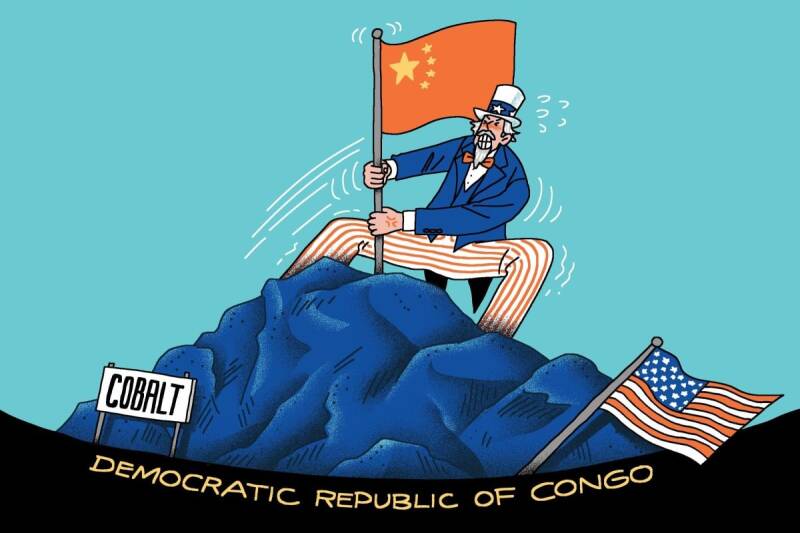

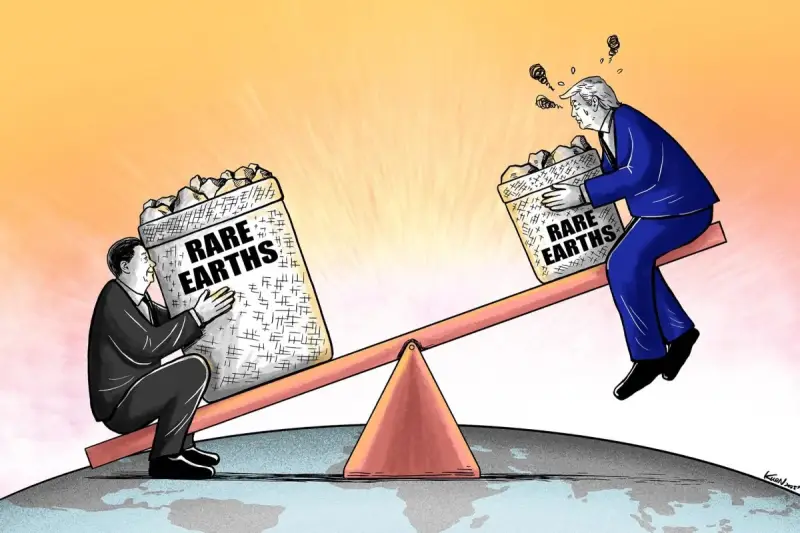
The new race to Africa and how Africans can win it
Europe needs Africa more than the other way around
Europe needs an industrialised Africa. It is in Europe's interest for Africa to develop a productive, modern, and formal economy.
-
Now that the climate horror is causing us a rude awakening with unprecedented disasters in Libya, heat waves, forest fires and floods also in Europe and the United States and at a time of military coups in the Sahel and Gabon, anti-Westernism in several African countries, below some recent "positive" cogitations on Africa-Europe relations, on the urgent – and feasible – acceleration of SME industrial partnerships and on Africa's modern manufacturing industrialisation.
-
It is clear that today Europe is providing urgent and massive humanitarian aid to disasters in Africa. Nevertheless, Europe will benefit greatly from the fact that neighbouring Africa, which will soon account for a quarter of the world's population, urgently generates "decent jobs" for twenty million of its young people who enter the labour market there every year. This thanks to the local processing of its raw materials. In this way, Africa will curb poverty, inequality, conflict and forced migration.
Treatment of symptoms
- Africa, a rich continent: its educated demographic dividend, 35% of the world's green hydrogen production capacity (Europe 1%), ubiquitous solar energy, the second - first? - green lung in the world, 60% of the world's agricultural land, abundant climate-strategic mineral resources, its thousand "stable" regions, the largest free trade market in the world under construction,...
- Africa, a poor continent with 20 million young people entering the labour market every year in search of an almost unattainable perspective.
The West and China continue to turn to Africa as a source of raw materials to add value and jobs at home. They prevent Africa from gaining experience for itself with the local transformation of its mineral resources into exportable products and the creation of millions of decent jobs.
A huge lag in modern industrialization is the root cause of poverty, corruption, inequalities, military coups, poor governance and forced migration in Africa. Not the other way around. Development cooperation and the SDGs treat symptoms and do not remedy the root cause.
Future growth market
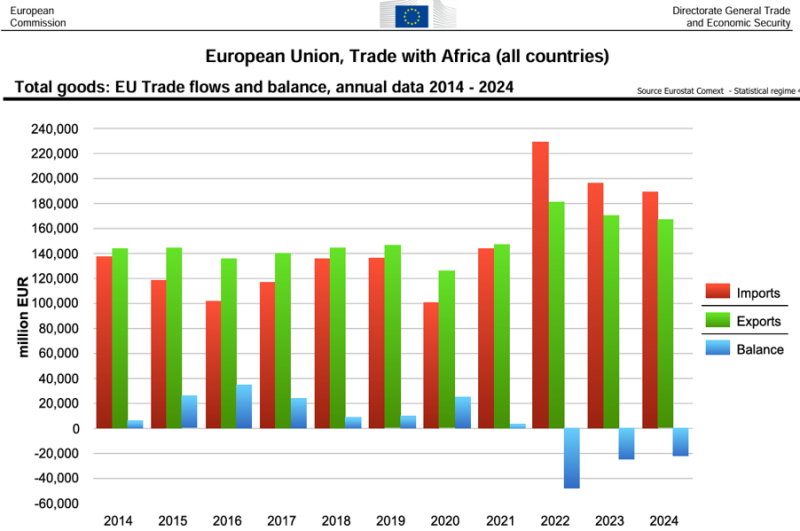
Neighbouring continent Africa
(2026: +/- 20% world population)
- 6.5% EU exports of goods
- 3.6% Belgian exports of goods
DR Congo (100 million inhabitants): 0.3% Belgian exports.
Europe's internal market is no longer growing. Protectionism in the US is increasing day by day. China is ahead of the rest of the world industrially and technologically.
Due to the lack of a wealthy middle class in Africa, EU exports are barely growing.
EUROPE needs Africa above all as a huge future growth market and for an aggiornamento of its own European industry, not with a "Palace diplomacy" like China or with a "Kalashnikov diplomacy" like Russia, but with a European "manufacturing industry diplomacy"
Europe does not need Africa as a storehouse of (climate-strategic) traw materials and green hydrogen or to fill in bottleneck professions, but to prevent the scourges of global warming and forced migration together.
Antiwestern resentment
In Gabon too, all parents are aware of the value of education. There, too, aunts and uncles sit together to provide a higher education for some of the most gifted of their dozens of children. Their frustration is immense when young engineers, economists, agronomists and computer scientists are still looking for decent jobs three years after obtaining their master's degree, awarded by professors with Western doctorates. They are the ones who are either open to extreme ideologies or – above all – express their anti-Western resentment and support military coups.
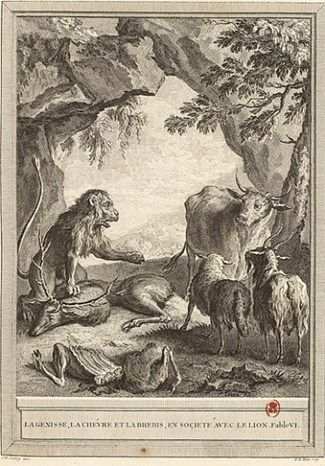
Leonine contracts
A large, educated and empowered African middle class is fed up with hypocritical Europe condescendingly lecturing it on human rights, democracy and the SDGs, but at the same time continues to acquire African natural resources and now also green hydrogen with "market-based" Leonean clauses to create wealth and jobs in Europe and thus prevent Africa from gaining practical experience with a labour-intensive, advanced industrialisation.
Twenty million decent jobs
This Africa says to Europe: "We have the huge educated middle class, the raw materials, also the climate-strategic ones, 50% of all renewable energy, the arable land of the world, the future market - 25% of the world's population - and 15 sub-Saharan countries with fairly stable institutions and accessible industrial sites. For now, Europe has experience of modern and complex international industrial value chains. Let's discuss how, out of mutual interest, to transform our raw materials into exportable products, create ten million formal jobs every year, prevent inequality, conflicts, forced migration and global warming, and stimulate a huge market, also for innovative European products and services with high added value. We know and understand each other. Let us work on it urgently."
Africa is aware that only its participation in international value chains will enable it to master the practice of modern and ultra-complex industrial processes and technologies and to take on the role of orchestrator of international industrial partnerships in the future.
That is why Africa, like all developed countries, is calling for international manufacturing industrial partnerships and foreign direct investments. That is why this Africa has no problem with the fact that, if desired, part of the profits made in Africa are repatriated to foreign shareholders.
Changing mentalities, both in Africa and in Europe
Europe does not know the "other" Africa
Interviews conducted over the past year with more than two hundred industrialists, development professionals, academics and administrators in Belgium, Germany, the Netherlands and France showed that only four of them were able to name three of the twenty fairly "stable" sub-Saharan countries documented each year by The Economist(*). Indeed, there is still a lot of corruption and misery in Africa. However, the stigmatising narrative of postcolonial aid to Africa dominates the mainstream media and gives the impression that “the entire Africa” is not yet ready for modern industrialisation. Quod non. Europe does not know the "other" Africa!
EU governments only must promote the “other” Africa. That’s all
Europe: a guided change of mentality of the whole-of-society
There is a real chance that a simple budget-friendly "whole-of-society" activity will raise awareness of the opportunities offered in fifteen to twenty sub-Saharan countries and in a thousand of "stable" regions in Africa. Countries with fairly stable institutions, an important developed middle class and abundant renewable energy.
Industrial investors will lay the foundations for the creation of twenty million formal jobs per year and put an end to frustrations, military coups of power and forced migration.
Europe’s industrial aggiornamento
- Sooner rather than later, shareholders of European energy-hungry mid-tech basic industries such as steel, petrochemicals, aluminium, fertiliser, cement, ceramics and glass will transfer their activities to regions with abundant green electricity and hydrogen. They expect that when their emission-free relocation to Africa is announced, their share price will shoot through the roof, especially when they simultaneously lay the foundation for a modern manufacturing industrialization of the whole of Africa and the largest free trade market in the world.
- Creative destruction. The loss in Europe of jobs in energy-intensive industry will force Europe to accelerate innovation in high-tech , more climate-friendly and recyclable products suitable for global markets and overcompensate for lost jobs in industries of the last century.
- Serendipity & frugal innovation. The massive cultural blending ("metissage") of skills of entrepreneurs and academics from two continents at a short cultural distance increases the chance that they will stumble upon innovative products and services of interest all over the world that can create millions of new jobs in both Europe and Africa. (radiology, penicillin, post-it, microwave oven, viagra, microsoft, ...)
Important side effects
-
Geopolitics
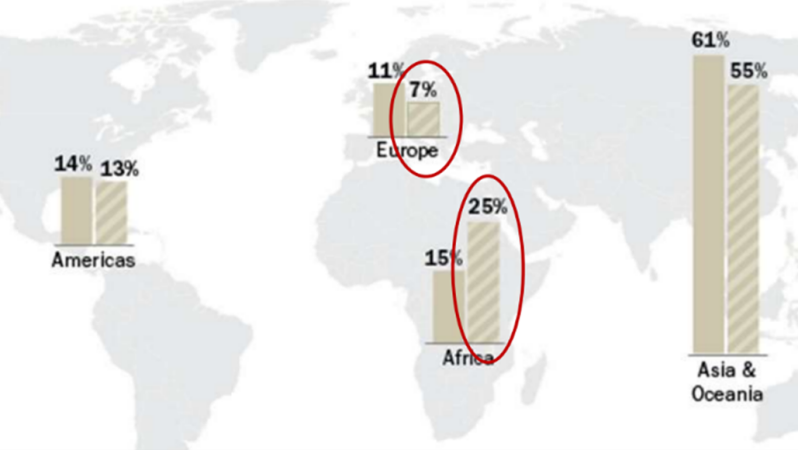
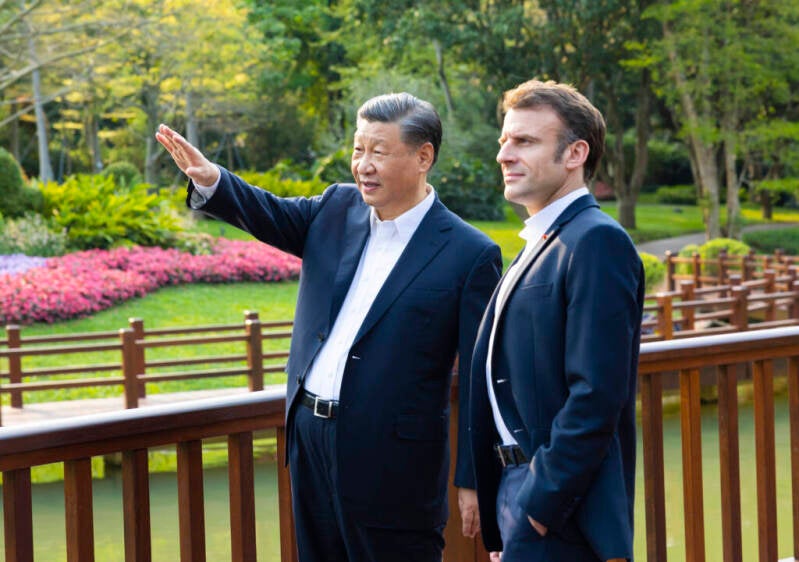
Africa 2035: as many skilled workers, in the prime of life, as China
World population 2050: Europe: 7% - Africa 25%
Africa 2050: 12 mega-metropolises with more than 15 million inhabitants
Africa 2050: 35% of all young people in the world (1.5 billion?)
"Hey Vladimir, I’ll be with you in a minute once I’ve finished with whoever this fellow is."
In 2050, Europe will have only 7% of the world's population, Africa 25%. Massive AU-EU industrial partnerships create a powerful geopolitical entente between neighbours with cultural-historical ties capable of taking the lead on a global level in consultations on issues that matter such as climate, energy, necessary human behavioural changes and international conflicts.
-
The largest free trade market in the world
Africa's modern industrialisation lays the foundation for the creation of the AfCFTA, the world's largest free trade market with 25% of the world's total population.
A permanent and massif cultural blending ("métissage") of African and European industrial know-how makes other continents eager to follow the shining EU-AU example of local processing of raw materials in a climate-friendly short chain and based on global competences and thus protect the entire planet from global warming above 1.5°C.

And how Africans could win it
More
A guided shift in European mindsets
‘Jobs’ that is what Africa is concerned about
A better way to help developing countries fight climate change
Gambling on development. Why some countries win and others lose (Derkon)
Energy Transition: a Tipping Point for More Justice in Africa-Europe Partnerships
Massive blending industrial know-how with Africa re-establishes Europe in turnmoil
An AU-EU Mandela-Schuman Community of Energy-Intensive Industries boosts world peace

19/9/2023 - update 9/01/2026
karel.uyttendaele{@}pandora.be


Maak jouw eigen website met JouwWeb